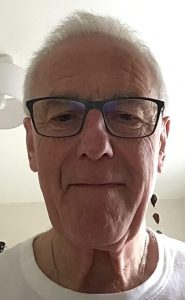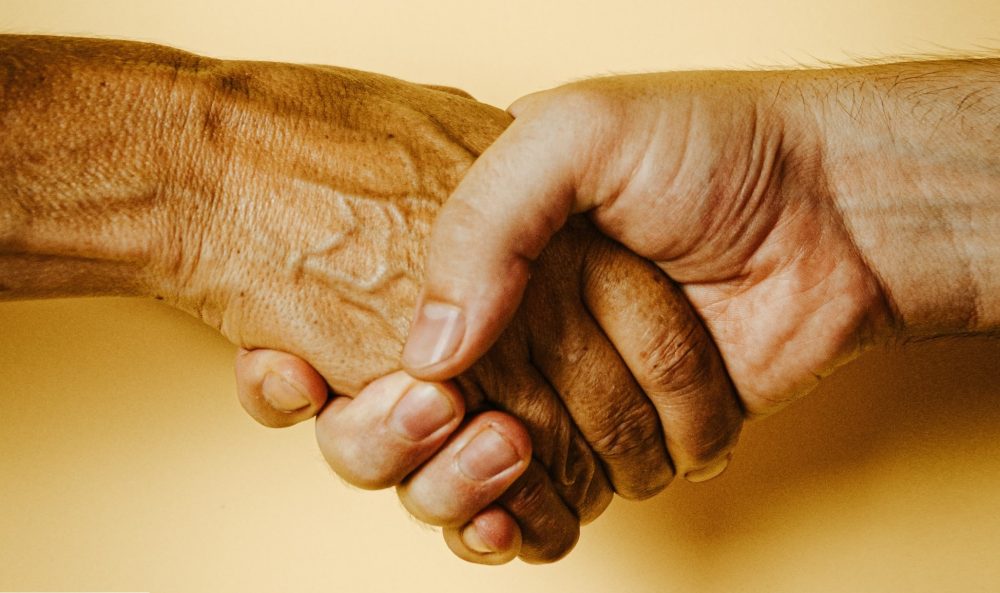 Mike Thirlwall is a retired GP
Mike Thirlwall is a retired GP
Just a thought…
I retired from General Practice in 2011 aged 63. I had been in practice for the best part of 40 years in a great team and was content to call a halt to the career I had loved.
A few months later I watched a TED talk by an American surgeon about the importance of touch in medicine.
He spoke about a woman who had been treated for breast cancer in a different part of the USA some years before and was coming to him for a routine checkup as she had now moved to the city he practised in.
As was his usual practice he asked her to go into his examination room and change into the gown provided. He entered the room and began to gently examine her scarred chest. She burst into tears and he stood back, horrified that he might have upset her.However she assured him that ,on the contrary, she was weeping because he was the first doctor to have touched her since her discharge from surgery. Her follow up had been regular, thorough and recurrence free but had taken place around a table with her attendants checking images and results on computer screens…reassuring her that all was going well.
For the first time since retiring I felt a twinge of sadness about what I had given up and I too shed some tears.
For the first time since retiring I felt a twinge of sadness about what I had given up and I too shed some tears.
As students over half a century ago we were taught the skills of examination: how to listen for heart murmurs, detect moist chest sounds, feel for liver edges and abdominal masses etc. by seniors who had honed those skills over years of examining both the pathological and the physiological. I doubt that I was alone in saying I could hear or see or feel things when I couldn’t, to avoid embarrassment at the bedside. It may be that many of these skills are now almost redundant (especially in secondary care) with the advent of echocardiography, ultrasound scans, CTs and MRIs and other sophisticated technologies. However, in GP surgeries and on home visits they are all we have.
I slowly acquired many of those skills during my years of practice, gradually being able to tune in to the mysteries of the heart and lungs, learning the importance of the overlaid second hand on the palpating hand, remembering to gently palpate women’s lower abdomen with a warm hand before proceeding to the invasive vaginal examination.
And of course I learnt the importance of the initial smile and hand shake to settle and reassure the patient that I was going to treat them with dignity ,and try to do my best for them.
All this is a preamble to my concern about the direction that practice in both primary and secondary care seems to be moving.
Over the years we GPs have moved out of consulting in our homes into purpose built surgeries and have mostly moved away from providing out of hours care for our own patients, so distancing ourselves from them in some ways. I understand the reasons for these developments and I benefited from them in my career. I am not advocating a return to the romance of Dr Finlay’s Casebook.
Although one might be signposted or given prescriptions and certificates, the chances of face to face contact with a familiar, trusted doctor or nurse are now slim.
Triaging demand for care predated the Covid epidemic but that period, of necessity, amplified its use dramatically until now it has become the norm to request online assistance with medical problems. Although one might be signposted or given prescriptions and certificates, the chances of face to face contact with a familiar, trusted doctor or nurse are now slim. Large cohorts of the most needy population are disenfranchised, for various reasons, by the lack of familiarity with computers and still need a friendly voice to enable them to navigate their healthcare needs.
The delegation of much, “minor illness,” to physician associates and nurse practitioners and of home visits to paramedics means the loss of the small building blocks of long term relationships with GPs – so important in the growth of trust and insight.
In secondary care it can be extremely difficult to personally get in touch with doctors that have seen us in clinics, they are shielded by websites or secretaries or switchboards. However the advent of specialty nurses has been a welcome communication bridge for many.
Others have highlighted the differences between relational and transactional medicine more eloquently than I could. The increasing availability of private online services is drawing away those who are used to instant responses from the likes of Amazon and Deliveroo. I fear that patients and family doctors may be steadily drifting apart and (If we are not careful) something very precious may be lost for ever.
Featured photo by Ave Calvar on Unsplash







This article expresses eloquently the concern regarding the degradation of Primary Care services and the GP – patient relationship. As always it will be the more vulnerable who are disproportionately affected by the changes taking place.